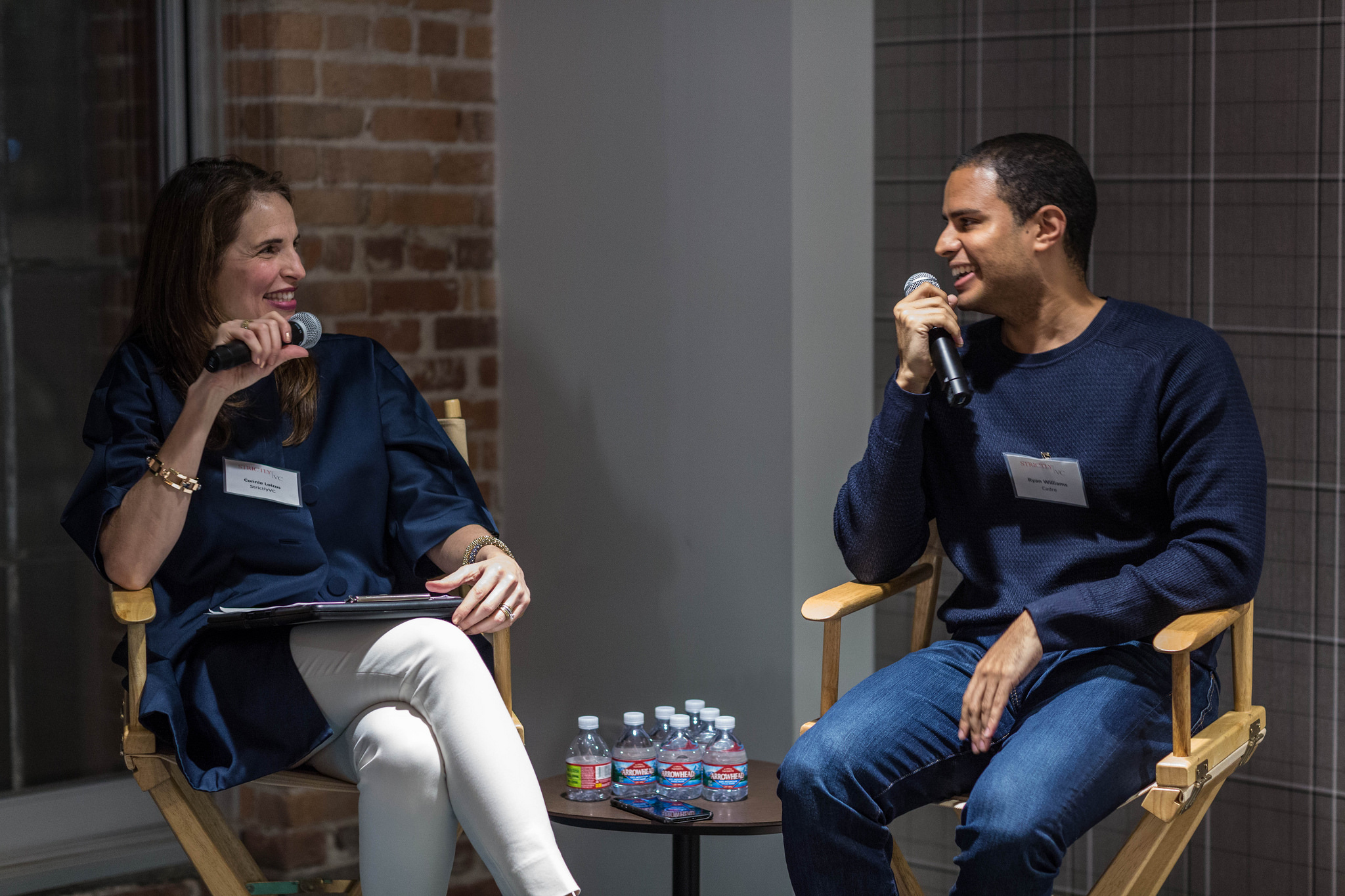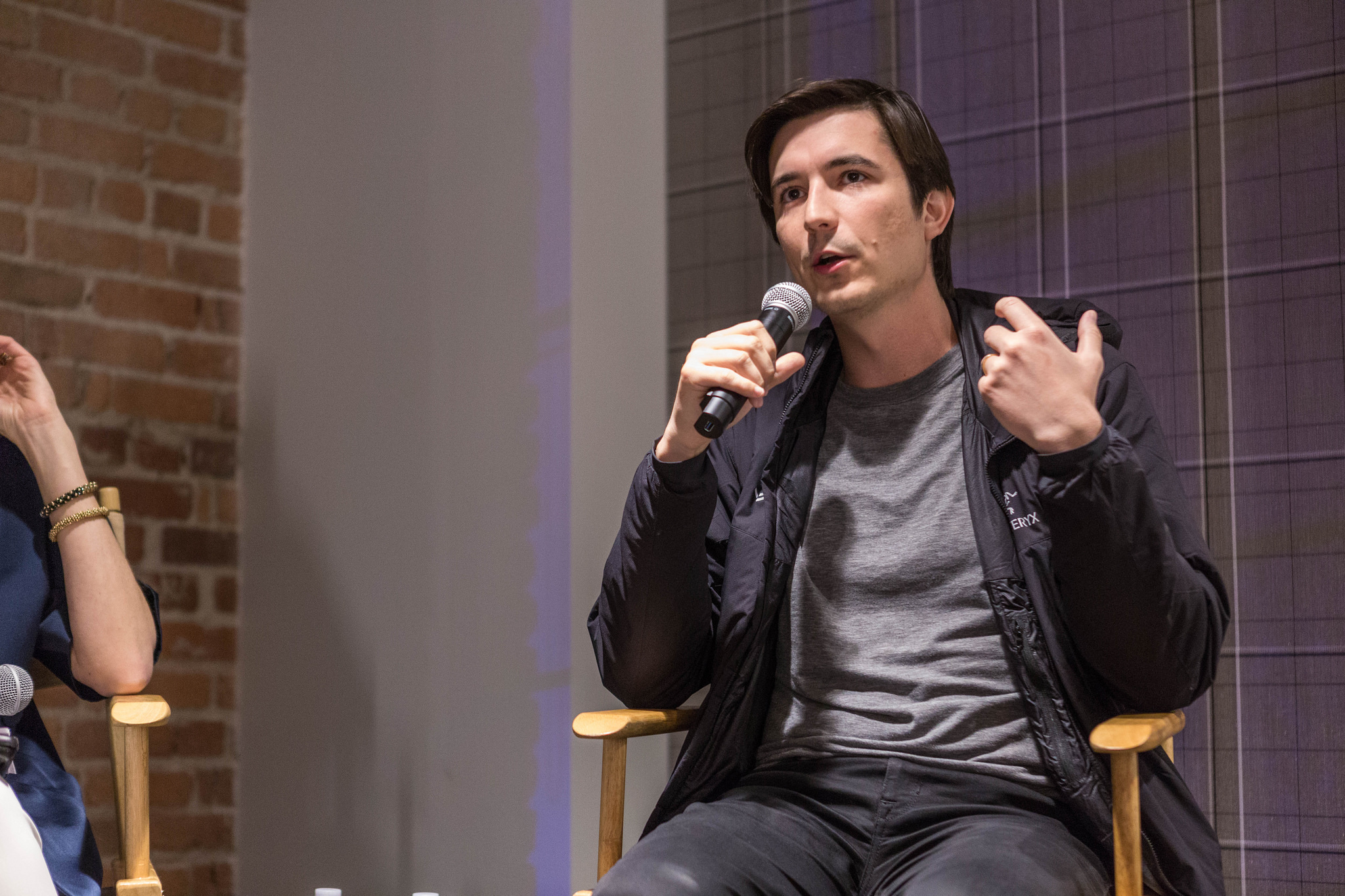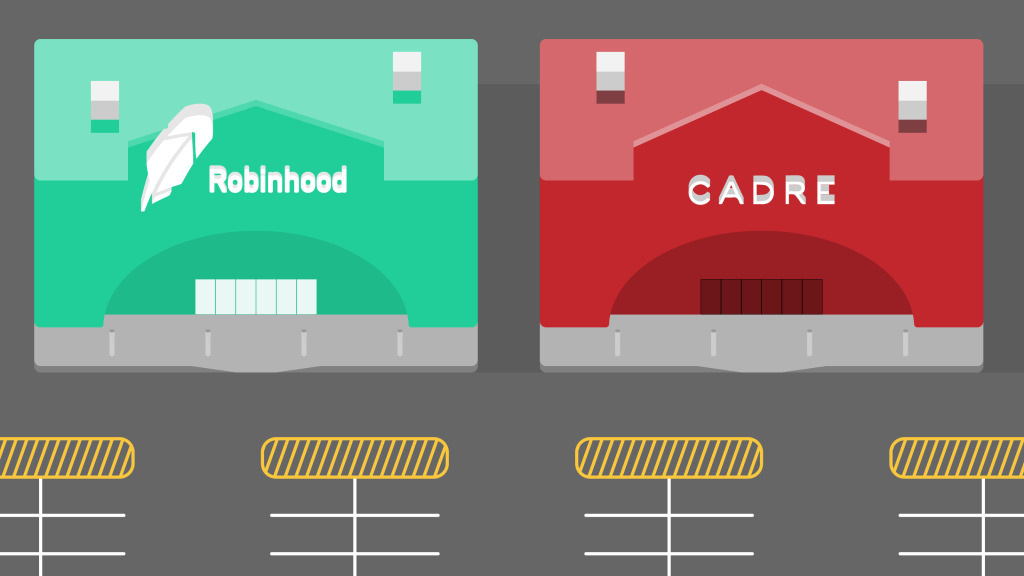The buzzy startups Robinhood and Cadre are known for different things. Five-year-old Robinhood has established its reputation by offering commission-free stock trading, while three-year-old Cadre burst onto the scene with a real estate investing platform. Yet both have developed similar ambitions to become financial “superstores,” using the Amazon playbook of starting in one place, and quickly expanding into other terrain.
“If you think about Amazon, they took the book model, built brand equity, trust, credibility and now they are a superstore for any retail product,” Cadre’s co-founder and CEO Ryan Williams told attendees at a StrictlyVC event in San Francisco last week. “We’re doing the same for the investments world.”
Robinhood’s co-founder and CEO, Vlad Tenev, speaking at the same event later in the evening, had much the same messaging. “Five years from now,” Tenev told the crowd, Robinhood will be a “full service financial institution” with every product one can find at a “local bank branch and more.”
Whether either startup or both will realize their dream is something we won’t know for years, but certainly both are already being watched closely by competitors, many of which find themselves playing catch-up these days. In fact, throwing the old guard off balance is largely the modus operandi of both companies.
It’s something they share in common with the company they are most trying to emulate — yet could ultimately find themselves competing against. As the WSJ reported just yesterday, Amazon is now in talks with big banks, including JPMorgan Chase, about building a checking-account-like product. You can guess it would be just the first of many financial products to come.
Money, money, money, money
The founders of Cadre and Robinhood come from distinctly different places. A Louisiana native, Cadre’s Williams was selling worms to bait-and-tackle shops by the time he was eight to pay for sports apparel, including sweatbands. As a teenager, struggling to afford merchandise from Nike and Adidas, he started his own custom-embroidery sweatband shop.
By the time he reached Harvard, Williams had the entrepreneurship bug. In fact, on a trip to Atlanta, he became convinced that there was an opportunity to reinvest in several communities rife with foreclosed homes, ultimately working with a syndicate of investors — including his Harvard classmate Joshua Kushner and Kushner’s older brother Jared — to buy more than 700 housing units before he was hired out of college in 2010 by Goldman Sachs, then Blackstone. (An asset management company wound up buying many of those homes, says Williams.)
Like Williams, Tenev of Robinhood didn’t necessarily imagine running a tech company. In fact, as the son of parents who worked for the World Bank, “I didn’t think that I would be an entrepreneur,” he said last week at the event. “I had no entrepreneurs in my family. It just started pretty much with two friends who wanted to get in business together” — Tenev and his Robinhood co-founder, Baiju Bhatt, who’d originally met at Stanford.
First the pair started an endeavor where they “didn’t care about making money or being successful at all, and that company actually wasn’t successful,” Tenev told the audience. While attendees laughed at the story, it wasn’t a joke to his parents. “When are you going back to school?” They asked. “When are you going to get a real job?” His parents, said Tenev, were “fairly risk averse. They took one big risk in moving our entire family from Bulgaria to the U.S. After that, it was basically like, ‘We’re done. Let’s just not screw it up.’ ”
Money, money, money, money
Despite their different backgrounds, the companies Williams and Tenev lead are now heading in remarkably similar directions.
Cadre, headquartered in New York, is currently a platform helping accredited investors delve into commercial real estate deals in what it claims is a far more transparent way. Williams likens its offerings to baseball cards. Visitors get information about the properties that have been sourced and approved by Cadre. For an upfront fee and a recurring subscription rate, they can then buy and sell a stake in a property based on their goals.
They also can trade their stakes to other investors on the platform. At least, some of them can. Cadre launched a secondary marketplace some time ago, says Williams, though he adds that it “hasn’t quite scaled the product quite yet.”
It hasn’t scaled its primary business all that extensively yet, either. To date, Cadre has funneled more than $1 billion in investors’ money into just under 20 commercial buildings, most of them in New York and four in California. But that hasn’t stopped investors from pushing piles of money in front of Williams. The company has so far raised $130 million from investors that include Founders Fund, Andreessen Horowitz, General Catalyst and the Ford Foundation.
It also has attracted $250 million from Goldman Sachs’s private wealth clients, money that will be funneled through the platform — and more partnerships with Goldman and others are coming, Williams told the audience last week. “I’m good at negotiating,” he said, amiably.
Perhaps it’s no wonder that Williams has stopped talking about Cadre as a real estate platform and now describes it instead as “the world’s first digital stock market for alternative assets.” With so many big brands backing it, what Cadre wants now is to “unlock every single potential product in the portfolio of our users and give them true diversification, so they can build their own sort of customized portfolio across non-equity products.”
Think timber, energy, private equity — even farmland.
Each are asset classes that are hard to break into, provide little visibility and which require long holding periods. Williams believes that by directing more investment into them — and letting investors buy, sell and trade their holdings — he can create a liquid marketplace that can operate around his former employers, Blackstone and Goldman, while blowing smaller, middle market players out of the water.

Robinhood, headquartered in Palo Alto, is also changing fast all of a sudden. Today, it is known as a commission-free trading platform that enables users to buy and sell equities. But it’s becoming almost as well-known for its waitlists. Robinhood has attracted four million users, but many of its newest customers gravitated to the platform for two products that are still being rolled out slowly. In late December, it announced the launch of commission-free options trading, a tool Tenev says many of its customers had requested. This month, it introduced fee-free crypto trading.
Both products have one million customers in line to use them, says Tenev.
Interest in the latter product in particular isn’t surprising. Coinbase, the six-year-old digital currency exchange based in San Francisco, currently rules the roost in terms of crypto trading. But the company, which first launched services to buy and sell Bitcoin back in 2012, has famously had problems catering to its fast-ballooning customer base. (It had more than 13 million registered users as of mid-November, compared with 4.7 million in November 2016.)
Coinbase also charges what some users complain are exorbitant fees on trades.
Robinhood is making some money, though presumably not much. It charges $10 a month for a margin account that allows users to borrow money to buy stocks. It also earns interest off assets under management, though Tenev declined to talk about how much in assets it oversees or what percentage of its customers are using that margin product, saying that Robinhood “prefers to talk about other numbers.”
In the meantime, the company doesn’t want to charge for trades so it can grow. Said Tenev to the audience, “A lot of people ask, ‘Why don’t you charge 99 cents or something? You could make a lot of money.’ But we’re willing to sacrifice that because we want to build a big business. We want to be known as the place that across the board offers customers the best prices and rates and customer experience.”
It was then that Tenev — like Williams before him — evoked Amazon. He said, “You look at a company like Amazon that has a similar strategy in retail e-commerce. People misunderstood that company for about 20 years. I think only recently has the Street and analysts started looking at it and saying, ‘There’s something here. [CEO Jeff Bezos] wasn’t just B.S.ing us in his shareholder letters.’ ”

That Tenev and Williams might share similar thinking isn’t a complete surprise. Both were graduating from college as the financial markets were imploding roughly a decade ago — with trust in household names like Lehman Brothers collapsing with them.
Newer cases of fraud, as uncovered last year at Wells Fargo, have only made younger investors even more dubious about entrusting their burgeoning assets with established players. (Tenev says that half of Robinhood’s users are first-time investors.)
The founding teams are also friendly. When Robinhood raised $110 million in Series C funding last year, Williams introduced Tenev and Bhatt to Thrive Capital, the venture capital firm co-founded by Joshua Kushner and one of Cadre’s first investors. In fact, Joshua and Jared Kushner are technically co-founders of Cadre, though Williams has long said the elder Kushner, who is Donald Trump’s son-in-law and White House advisor, has “no operational control, governance or say on the company.”
Mean, mean green
Cadre and Robinhood share another trait, too: Neither company is willing (right now) to think about being acquired. Williams, whose company was valued at its last financing at $800 million, readily concedes that a long list of things have to go its way for things to work out as planned. But he already sees a day when Cadre has established a “more liquid platform” that has “even big players clamoring to be involved with us” because “they don’t have liquidity.”
Meanwhile, asked if Robinhood might accept a big check from Charles Schwab or E*trade, both of which are struggling to sign up the millennials who are flocking to Robinhood, Tenev said last week, “I wouldn’t take it. We aren’t doing this for the money, and I’d hate to see the mission die.”
Said Tenev of Robinhood, which has raised $176 million to date and boasts a $1.3 billion valuation: “We’re doing this because we see an opportunity to build a really, really big company that’s very, very customer friendly. And the rewards from the seeds that we’re planting are going to germinate later than most other companies. We’re really looking at it 10 or 20 years down the road.”
If it has that kind of time. Given Amazon’s new interest in financial services, it may not.
“We thought that fintechs would provide the chief digital threat” to traditional institutions, read a McKinsey report that came out last fall. Instead, the report observed, e-commerce giants are “reshaping one industry after another, blurring sector boundaries as they seek to be all things to all people.”
Indeed, while banks are watching nimble players like Cadre and Robinhood with superstore ambitions, the bigger danger — if these startups don’t move fast enough — may be the ultimate superstore itself.
(Photos of Ryan Williams and Vlad Tenev, courtesy of StrictlyVC/Dani Padgett.)






























Comment